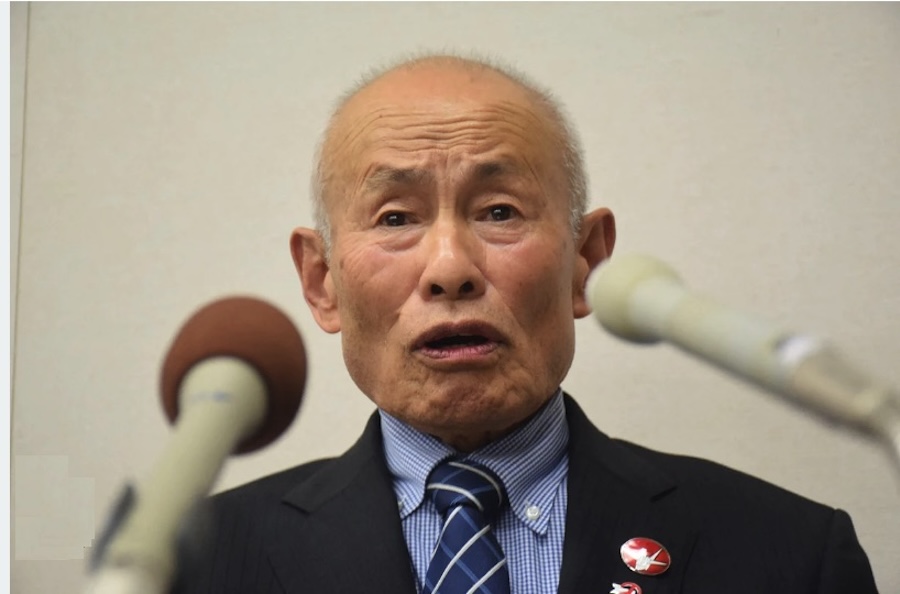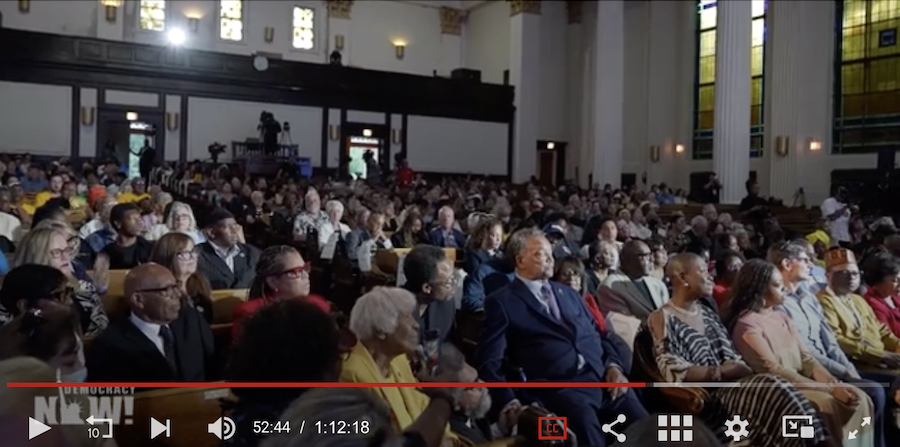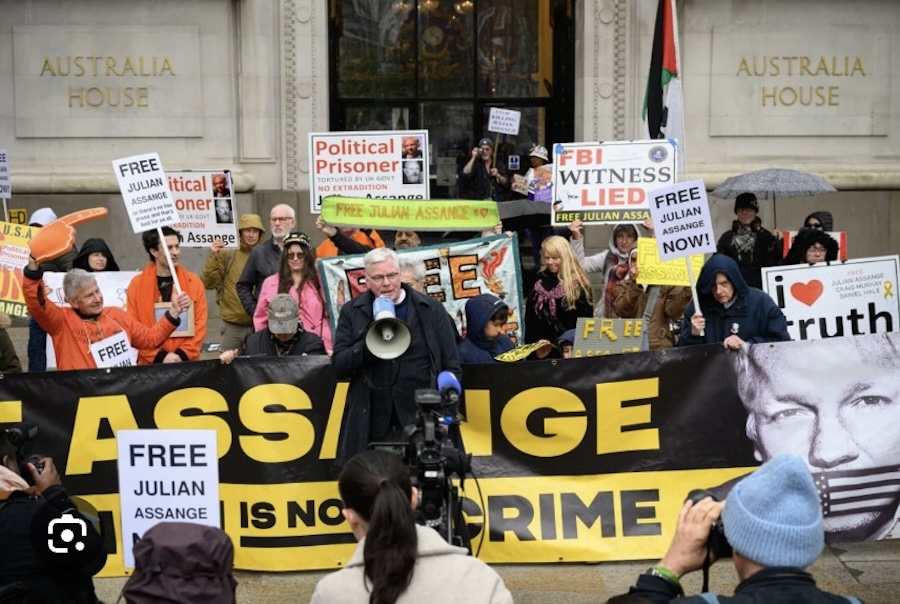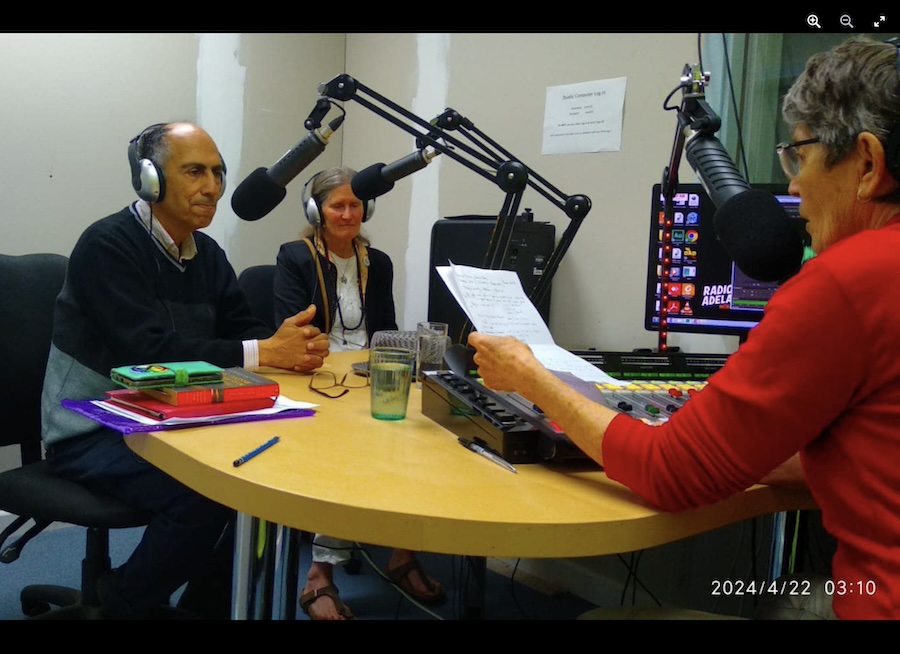. . HUMAN RIGHTS . .
An article from In These Times
Early this month (February 2024), a federal judge dismissed a case brought by the Center for Constitutional Rights (CCR) charging U.S. President Joe Biden, Secretary of Defense Lloyd Austin, and Secretary of State Antony Blinken with complicity in the Israeli-led genocide in Gaza.
But while many media outlets were quick to report on the case not moving forward, they largely missed a key aspect of the ruling: the judge did not dismiss the case on its merits but rather because it fell “outside the court’s limited jurisdiction,” therefore rejecting it on technical grounds. In fact, U.S. District Court Judge Jeffrey White’s statement appeared to uphold some of plaintiff’s key charges in the case: “Both the uncontroverted testimony of the plaintiffs and the expert opinion proffered at the hearing on these motions as well as statements made by various officers of the Israeli government indicate that the ongoing military siege in Gaza is intended to eradicate a whole people and therefore plausibly falls within the international prohibition against genocide.”
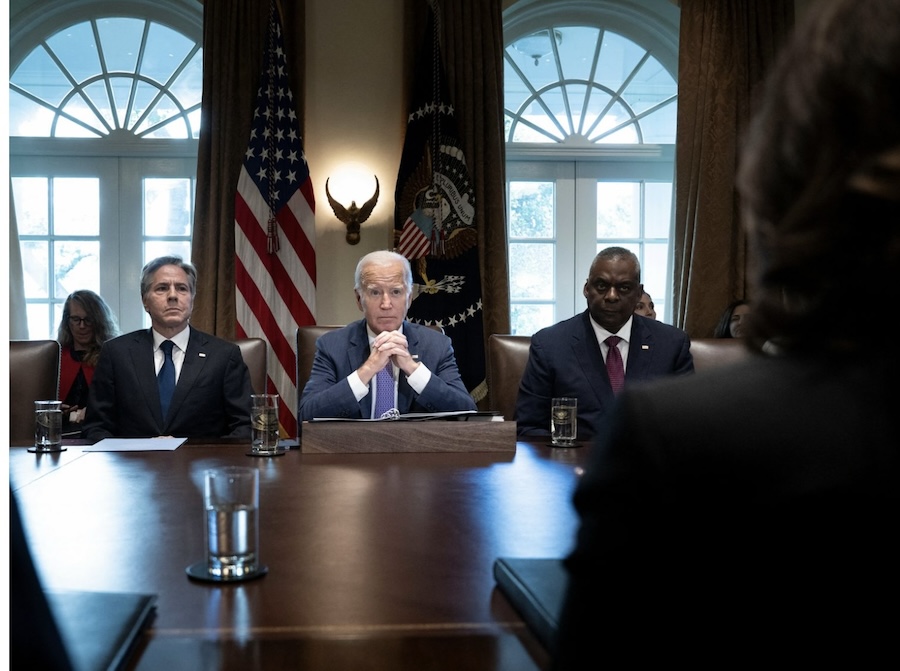
US Secretary of State Antony Blinken, US President Joe Biden, and US Defense Secretary Lloyd Austin look on during a Cabinet meeting in the Cabinet Room of the White House in Washington, DC, on October 2, 2023.
(PHOTO BY BRENDAN SMIALOWSKI/AFP VIA GETTY IMAGES)
The judge went further, urging Biden and his administration officials to scrutinize “the results of their unflagging support” for the Israeli government’s assault on Gaza.
Judge White was not alone in his appraisal. The case, first heard on January 26 in front of the U.S. District Court for the Northern District of California, saw roughly 100 human rights and humanitarian aid groups write briefs supporting CCR’s charges against the Biden administration.
These briefs make it abundantly clear that the Biden administration, in its steadfast support of the Israeli government, is complicit in the ongoing genocide, the displacement of approximately 80% of Palestinians from their homes and the deaths of more than 29,000 so far in this latest chapter of a year-long Nakba (catastrophe) that never ended.
CCR’s lawsuit underscored the plight of a Palestinian people asserting their humanity and refusing to be sacrificed at the altar of the 1948 Genocide Convention—which tasks governments with preventing genocides and forbids their complicity in genocides perpetrated by another party — and the U.S. Genocide Convention Implementation Act, passed in 1988, which incorporates this mandate into U.S. law.
As multiple human rights advocates and experts such as Israeli historian and Associate Professor of Holocaust and Genocide Studies Raz Segal have laid out, Israel is carrying out a textbook case of genocide” in Gaza, backed by clear genocidal intent, laid bare in Israeli Minister of Defense Yoav Gallant’s Oct. 9 declaration: “We are imposing a complete siege on Gaza. No electricity, no food, no water, no fuel. Everything is closed. We are fighting human animals and we will act accordingly.”
In response to the case, the Biden administration countered that CCR’s lawsuit should not move forward because supporting Israel is a foreign policy decision reserved for the executive branch, free from judicial interference; that the United States is not responsible for how Israel, a foreign government, acts; and that there is no federal law allowing the plaintiffs to sue.
CCR noted, first, that the issue is not whether the U.S. can make foreign policy decisions involving Israel but rather that the decision to aid in a genocide violates federal law, and the courts have a duty to uphold the law even against U.S. officials.
Second, CCR explained in detail how the Biden administration, far from a neutral spectator, is actively supporting the genocide through military, economic and diplomatic assistance.
Militarily, Secretary Blinken exercised emergency powers twice in December to approve the sale of armament worth approximately $254 million. According to the Defense Department, these supplies come from the War Reserve Stocks for Allies-Israel (WRSA-I), an obscure U.S. stockpile in Israel containing billions of dollars’ worth of equipment.
The administration now seeks to loosen WRSA-I restrictions for Israel, expanding access to weaponry, increasing the annual stockpile limits, and removing legislative oversight, while adding to the privileges Israel already enjoys such as permission to withdraw WRSA-I items without the prior justification required of all other recipient countries.
The U.S. has provided (or is on track to provide) Israel over 25,000 tons of military supplies: dozens of F‑35 and F-15 fighter jets (to be received in the coming years), a dozen Apache helicopters, two thousand Hellfire missiles, MK‑ 84 bombs and Joint Direct Attack Munitions to guide them, Spice bombs, M141 bunker‑buster munitions, one million rounds of 7.62 mm munitions and thousands of 155 mm artillery shells, 30 mm cannon munitions, night‑vision devices and much more. Meanwhile, the presence of U.S. surveillance drones in Gaza suggests the possibility of greater U.S. military involvement than previously thought.
Financially, President Biden requested an emergency supplemental budget exceeding $14 billion to support Israel. The House of Representatives responded with a bill reflecting this amount plus billions of dollars for joint operations assistance. The Senate has now passed a bill for $14 billion permitting the supply of currently forbidden military items to Israel, as well as waiving WRSA-I caps. These bills are currently being debated in Congress but enjoy broad bipartisan support.
And, diplomatically, the United States exercised its veto privilege at the United Nations Security Council to stall international calls for a cease-fire in Gaza on October 18, December 8 and February 20. The December instance followed UN Secretary General António Guterres’s invocation of Article 99 of the UN Charter to refer to the Security Council a “ matter which, in [his] opinion, may aggravate existing threats to the maintenance of international peace and security.”
Article 99 was last invoked in 1971 preceding the split of Bangladesh from Pakistan. Additionally, the UN General Assembly overwhelmingly supported cease-fire resolutions on October 27 and December 12 , both of which the U.S. voted against. And, on December 22 , the U.S. abstained from a Security Council vote to direct humanitarian aid to Gaza after stalling for four days to remove a call for cease-fire from the resolution.
These various forms of support unequivocally constitute aiding and abetting of Israel’s cataclysmic destruction of Gaza, and the CCR argued as much in establishing that the U.S. has been actively complicit in the ongoing genocide.
Relatedly, the CCR referenced this very aiding and abetting in claiming that they do have a federal right to sue under the Alien Tort Statute (ATS). As they explained, “aiding and abetting liability, particularly for U.S. defendants,” triggers the ATS goal of “provid[ing] a forum for violations of international law.”
(continued in right column)
Question related to this article:
How can war crimes be documented, stopped, punished and prevented?
(continued from left column)
Therefore, the CCR concluded, the courts do have a constitutional duty to put an end to the executive branch’s complicity in genocide; the executive branch is complicit based on its clear aiding and abetting in the form of military, financial and diplomatic support; and the ATS permits plaintiffs to sue federal officials for their violations of the Genocide Convention.
No conditions
CCR further charged Biden, Blinken and Austin with failure to prevent the genocide. The Genocide Convention and customary international law compel governments to exercise due diligence to prevent genocide, and self-defense is legally insufficient as a justification for eradicating a population. U.S. officials are liable if they could likely influence Israel’s conduct and if they should have known that Israel’s acts raised a serious risk of genocide in Gaza.
In Gaza, the U.S. indisputably can influence Israel’s conduct. The U.S. fills 92% of Israel’s arms imports. Much of this equipment can only originate from the U.S. as it utilizes proprietary technologies. Defense Minister Gallant admitted as much, when the U.S. pressured for humanitarian aid to Gaza, noting that “[t]he Americans insisted and we are not in a place where we can refuse them. We rely on them for planes and military equipment. What are we supposed to do? Tell them no?” The Biden administration similarly boasted about its influence in persuading Israel to pause aggressions for seven days in late November.
And the United States is doubtlessly aware of the ongoing genocide in Gaza. The CCR shared its emergency legal briefing paper with Biden, Blinken, and Austin in October explaining these exact points. The International Court of Justice (ICJ) ruled in January that there is a plausible risk that Israel is carrying out genocide. Additionally, more than 800 public officials and diplomats across a range of countries, close to 80 of whom are based in the U.S. and work primarily within Blinken’s State Department, warned in February that their governments were at risk of being complicit in genocide.
In a previous case, the ICJ found Serbia to be liable for failing to prevent the genocide of Muslim communities in Srebrenica in 1995 by the Bosnian Serb forces, an independent actor that perpetrated the genocide with the support of the Serbian government. Dr. William A. Schabas, a renowned Professor of Human Rights Law and International Criminal Law, concluded that U.S. complicity in the war on Gaza “ has many parallels” with the Serbian government’s complicity in Srebrenica since, like the relationship between Israel and the U.S., “[t]he Bosnian Serb forces were very dependent upon weaponry and other logistical support from Serbia, and there were strong political and economic ties” between the two. The U.S. acknowledged this very duty to prevent genocide when it commented in support of Ukraine’s case against Russia at the ICJ in 2022.
The Biden administration blanketly denies the genocide charges against Israel while refusing to investigate them altogether. President Biden vowed that his “ administration’s support for Israel’s security is rock solid and unwavering.” Secretary Blinken has stated his view that South Africa’s “ charge of genocide [against Israel before the ICJ] is meritless.” And White House Coordinator for Strategic Communications John Kirby said, on behalf of the Biden administration, that “[w]e find [South Africa’s] submission meritless, counterproductive and completely without any basis in fact, whatsoever,” later insisting that “ we find that that claim is unfounded.”
More recently, former Speaker of the House Nancy Pelosi baselessly claimed that “ nothing [the U.S. has] sent since Oct. 7 [to Israel] has contributed to this brutality,” despite well recorded evidence to the contrary.
The U.S. State Department ordered officials to refrain from using the phrases “ de‑escalation,” “ cease-fire,” “ end to violence,” “ end to bloodshed,” and “ restoring calm” in press releases, and Secretary Blinken was found to have deleted references to a cease-fire in his posts on X (formerly Twitter) after they had already been sent out.
Conspicuously, a State Department task force on preventing atrocities took a full two weeks into the extremely brutal assault before meeting to discuss Israel and Palestine, and it was nevertheless sidelined by the administration.
According to Kirby, the U.S. imposes no conditions on weapons transfers to Israel even though the Foreign Assistance Act, the Leahy Law, and the Conventional Arms Transfer policy prohibit transfers when the weapons are likely intended to be used for genocide. Notably, transfers to most countries can be put on hold if one stakeholder suspects an item will be used unlawfully. In the case of Israel, multiple stakeholders, including the Bureau of Near East Affairs (NEA) and the U.S. Embassy in Jerusalem, must first agree that such risk exists, and the hold must be approved by the Deputy Secretary of State.
Moreover, these transfers are shrouded in secrecy. Whereas the U.S. published pages detailing what weapons, and in what quantities, it provided to Ukraine, governmental disclosures concerning Israel amount to one brief sentence. Josh Paul, former director in the State Department’s Bureau of Political-Military Affairs, remarks that there is no benefit in this secrecy except diminished oversight.
And the administration insists that it has remained close to the Israeli officials perpetrating the genocide. Kirby claimed that “ we have, since the beginning of the conflict, in the early hours, maintained a level of communication with our Israeli counterparts to ascertain their intentions, their strategy, their aims.” Secretary Blinken has held hours-long conferences with Israeli military officials, and Secretary Austin had near-daily calls with Minister Gallant “ to meet Israel’s needs, which include air defense, precision guided munitions, artillery and medical supplies.”
Responsibility to act
The U.S. District Court in California, spotlighting the ICJ’s finding of plausible genocide, implored the administration to reconsider its course for the welfare of the Palestinian people, finding the judiciary to be lamentably powerless to interfere with foreign policy decisions.
Looking to the future, a group of South African lawyers stated to the Biden administration their intention to sue the U.S. government for “ aiding, abetting and supporting, encouraging or providing material assistance and means to Israel” during a genocide. On February 12 , the South African government urgently requested that the ICJ use its powers to prevent further genocidal acts by Israel in light of the most recent attack on Rafah, “ the last refuge for surviving people in Gaza.”
As the CCR case makes clear, the United States government is currently facilitating the annihilation of Gaza and the Palestinian people. In the face of this massacre, Congress has a responsibility to rein in the abuses of the Biden administration by exercising its review authority to end any further aid to the Israeli government. While recent efforts to condition such aid have failed, that should not prevent members of Congress from taking a clear stand: now is the time to hold the Biden administration accountable for its complicity in the crime of genocide.
(Editor’s note: Recent polling data (May 8) in the United States indicates that 39% believe Israel is committing genocide against the Palestinian people living in Gaza, 38% saying Israel is not, and 23% saying they don’t know. A majority of Democrats (56%) and a slight plurality of Independents (36%) say they believe Israel is committing genocide in Gaza.)
– – – – – –
If you wish to make a comment on this article, you may write to coordinator@cpnn-world.org with the title “Comment on (name of article)” and we will put your comment on line. Because of the flood of spam, we have discontinued the direct application of comments.
